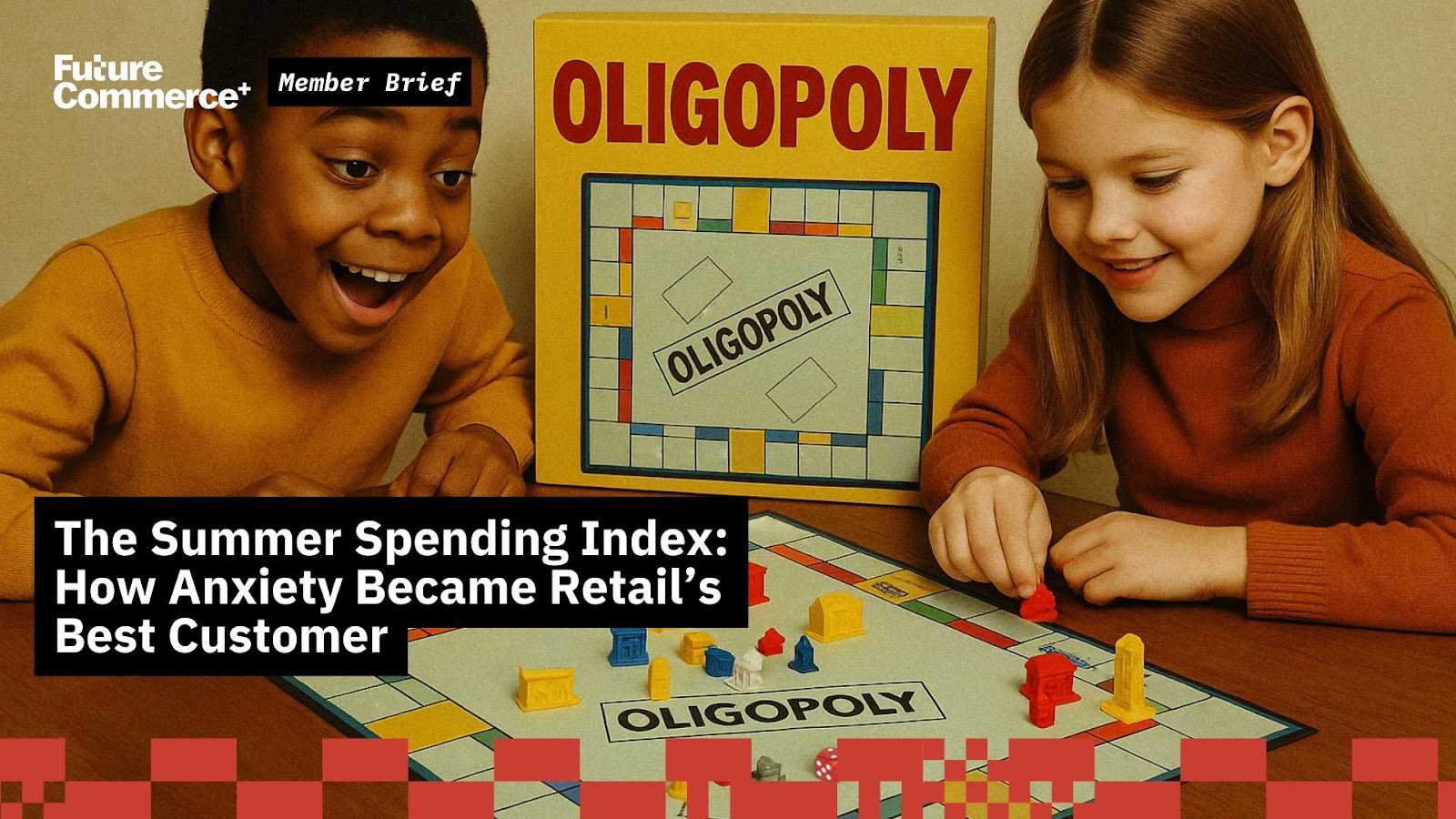
Hot Oligopoly Summer: How Anxiety Became Retail's Best Customer

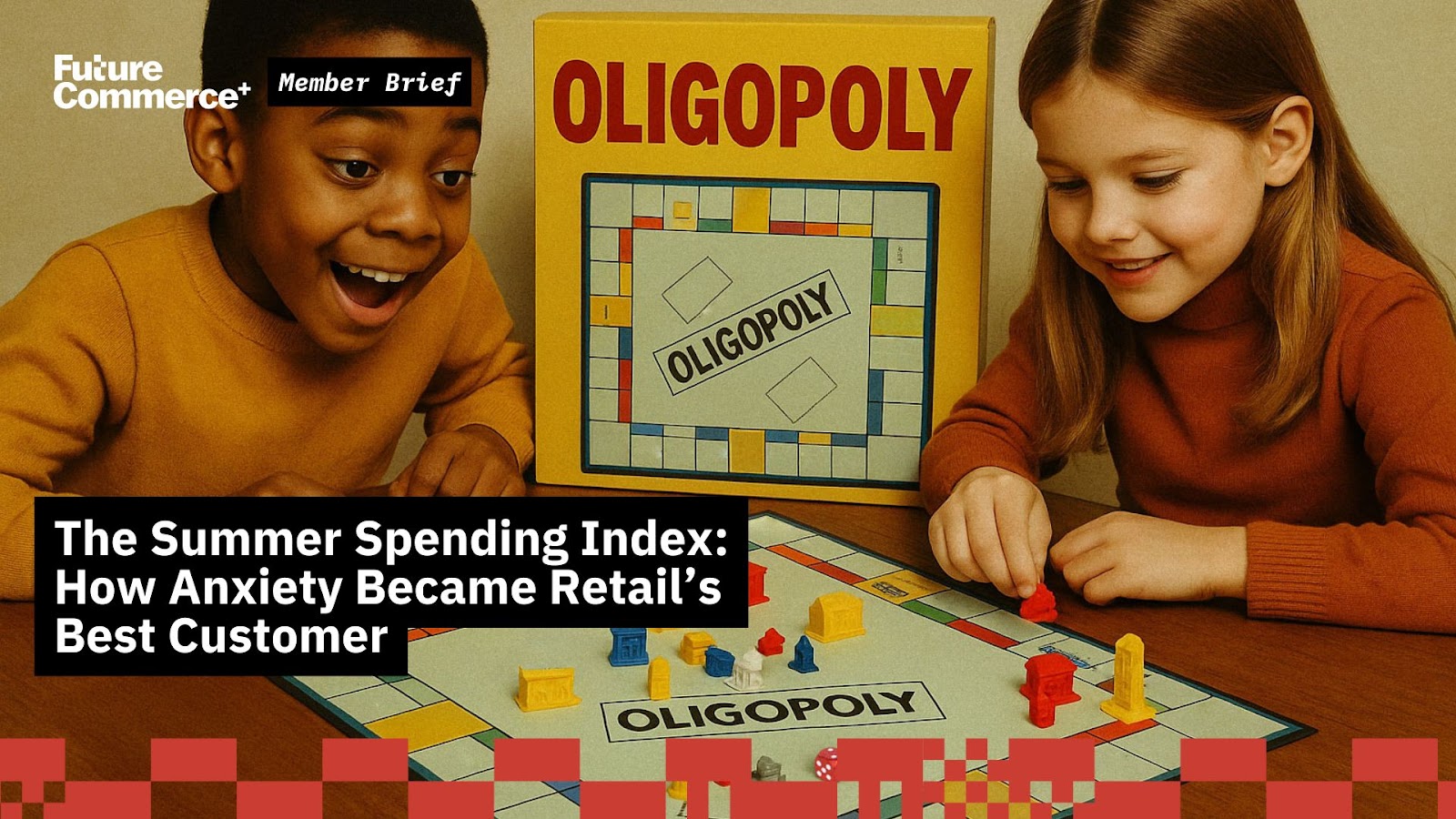
Welcome to Wednesday, futurists.
We’re in the heart of summer, when we historically would not have a care in the world.
But for some, senseless spending on barbecues and sporadic trips abroad is being replaced by careful price comparison and early preparation for the new school year.
We’re in the midst of a cultural shakeup, with economic ambiguity and political pageantry infiltrating our minds and wallets. Plagued by newscycle whiplash and a constant fear of the future, consumers are still spending, albeit differently.
In this Member Brief, we unpack the psychology behind current retail and travel spending trends. We call it The Summer Spending Index: a breakdown of when, why, and how shoppers are opening (and closing) their wallets, and what it signals for the back half of the year.
Summer 2025's spending surge revealed the oligopoly's greatest trick: convincing consumers that choosing between Amazon, Walmart, and Target constitutes meaningful choice in American retail.
If you're a brand, retailer, or cultural strategist trying to read the mood of the market, this is your cheat sheet.
— Phillip


The Lazarus of Leggings. Founder and friend of FC Ty Haney is back at Outdoor Voices with her original creative team, and they’re gearing up to launch a new collection on August 4.
Outdoor Voices was part of the original class of DTC darlings and lauded for sparking the “sweat-to-street” fashionable athleisure trend. However, in a case of growth at all costs, the brand opened and ultimately shuttered its 15-store fleet. Now, the brand is back, this time under Consortium Brand Partners, which also owns Draper James and Jonathan Adler. Haney’s return is a declaration: “We’re back, baby,” signaling a reset of the “Doing Things” ethos.
The OV comeback feels surreal given the current DTC climate and the ongoing shakeup happening in the fitness apparel space. Critics continue to challenge the DTC model itself, especially as brands like Warby Parker see growth as omnichannel businesses. At the same time, Lululemon, which was once the dominant force in activewear, is losing market share: net profit forecasts were cut in Q1 amid tariffs, inflation, and product missteps.
Reintroducing OV into this maelstrom is bold, maybe mad? But it’s also a test: can product-driven storytelling and authenticity still revive a brand in an unforgiving retail reality?

Slip-On Slip-Up. HandsFree Labs, the company behind fast-growing shoe brand Kizik, has sued Skechers, accusing them of copying homework but for feet.
The lawsuit pulls no punches, accusing Skechers of having a business model built on “shamelessly copying” others, including Adidas and Nike, and directly linking Skechers’ slip-on boom to its recent $9.42B acquisition by 3G Capital. The slip-in shoes now account for about 35% of all products on the Skechers website.
Skechers’ response? Pure denial. The brand dismissed the claims as baseless and asserted itself as the “leader in hands-free footwear,” touting its portfolio of 140+ patents. President Michael Greenberg suggested the suit was opportunistic, surfacing only after the merger news dropped. He even went as far as accusing Kizik of chasing a payday.
Beyond the courtroom drama lies a bigger question about innovation, IP, and category creation. Kizik, with over 200 patents and licensing agreements with Nike, argues it built a business moat. Skechers, a brand notorious for “inspirational borrowing,” claims it just built better and faster. It’s a very 2025 showdown: an upstart tech-centric brand vs. a corporate juggernaut with a boat-load of bucks.

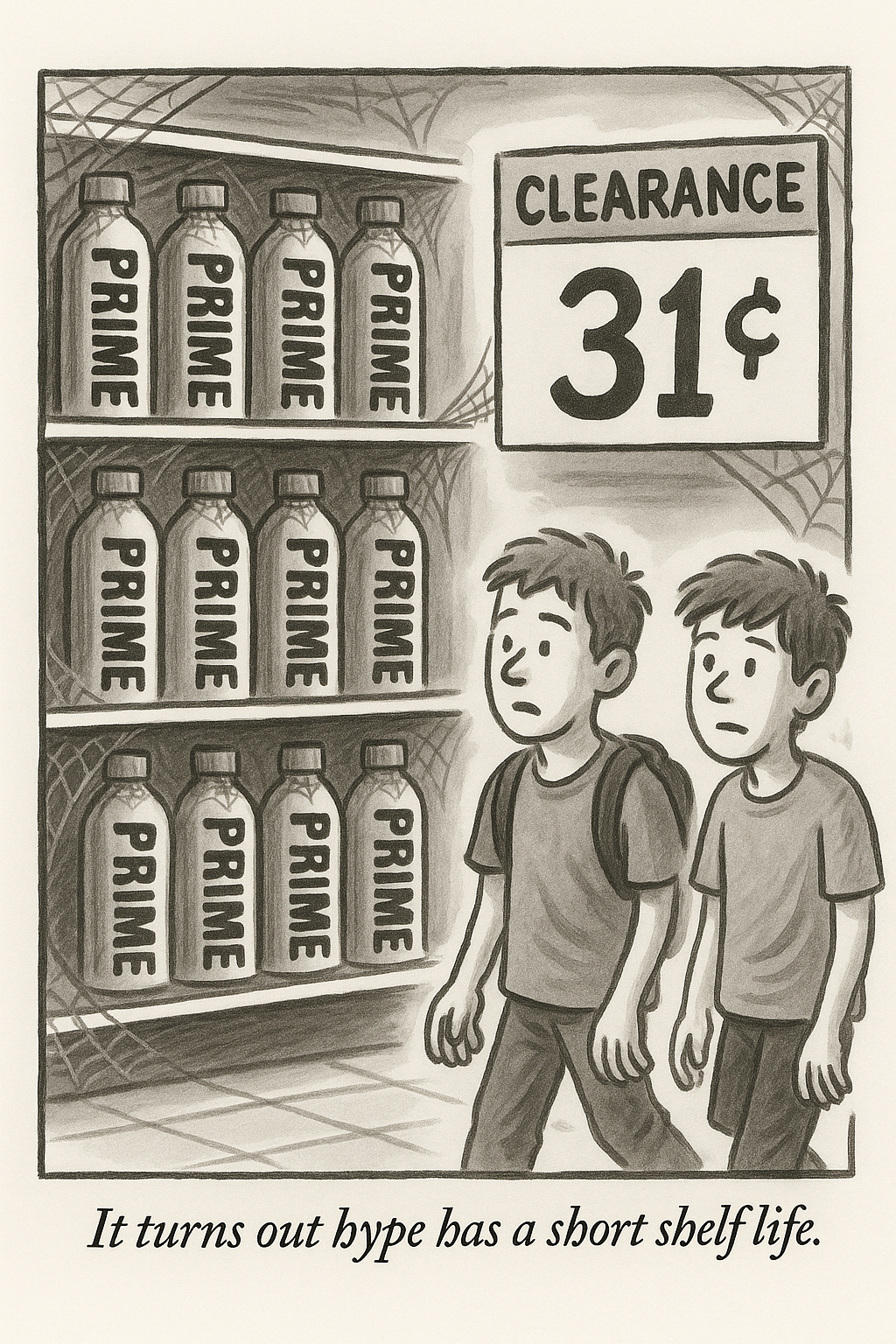
Thirst Trap Collapse. Even the most hyped influencer can’t save mid, and Prime Hydration, the sports drink from Logan Paul and KSI, is a shining example of that fact. After sprinting into 90,000 stores and exceeding $1 billion in sales, the brand has smashed into a growth brick wall. Consumer demand has plummeted, with sales falling up to 70% in the UK and 40% in the US. The kids who seemed to love the brand and product so much have just moved on.
Maybe it was never really about the product. It was about the status and clout-chasing embedded in the creator-to-brand pipeline.
Buzz doesn’t equal a viable long-term brand, and YouTube thirst traps don’t generate long-term loyalty. (Only 12% of consumers bought it more than once. Oof.) Prime was able to bank on hype to get its foot in the retail door. It just couldn’t stay there.
Don’t Drink and Live. TalkShopLive believes the next frontier of livestream commerce is liquor. The platform, known for celebrity-fueled shopping streams, is the first in North America to enable legally compliant alcohol sales during live shows.
The opportunity seems obvious for TalkShopLive: there are more than 350 celeb-backed alcohol brands, and fame-obsessed fans are willing to pay up to 73% more for them. But with US alcohol consumption declining, especially among Gen Z, we can’t help but wonder who, exactly, this is for. Not to mention, the 500-pound influencer gorilla in the room: live shopping still hasn’t quite hit this market.
Emarketer notes that live commerce still makes up less than 5% of U.S. eCommerce sales, versus nearly 20% in China. Platforms like TikTok Shop and Amazon Live are struggling to boost adoption, but could TalkShopLive’s embeddable, app-free experience (or the tequila) be a draw? We don’t have to tell you how we feel…


‘Personal Superintelligence’ Is Meta’s New Metaverse. Mark Zuckerberg has shared a new manifesto. Rather than envisioning a world filled with floating heads in virtual conference rooms, he’s laser-focused on democratizing “personal superintelligence.”
According to Zuckerberg, superintelligence will “help you achieve your goals, create what you want to see in the world, experience any adventure, be a better friend to those you care about, and grow to become the person you aspire to be.”
He added that while other players in the AI field believe superintelligence should focus on automating all valuable work and having humanity live off of those outputs, Meta plans to put the power in humans’ hands. (Or so he says.) The end goal? Less time in apps and productivity tools, and more time creating and connecting.

Dawn of the Clankers. In a move we could have predicted years ago, oh wait, we did!, humans are starting to rebel against our robot future. Originally used as a derogatory term for battle droids in the Star Wars prequels, “clankers” is now the go-to insult for real-world robots and AI.
From personal assistants to robotic waiters, “clankers” are infiltrating every aspect of our lives. In an increasing number of cases, robots are eliminating the need for our creative existence, especially in fields like marketing. It was only a time before the tides turned and the dialogue changed.
It isn’t the first time Star Wars has managed to predict the future of culture and commerce. Back in April, we wrote about how Revenge of the Sith’s trade war subplot manifested in American life when President Trump accused Amazon of “hostile and political acts.”








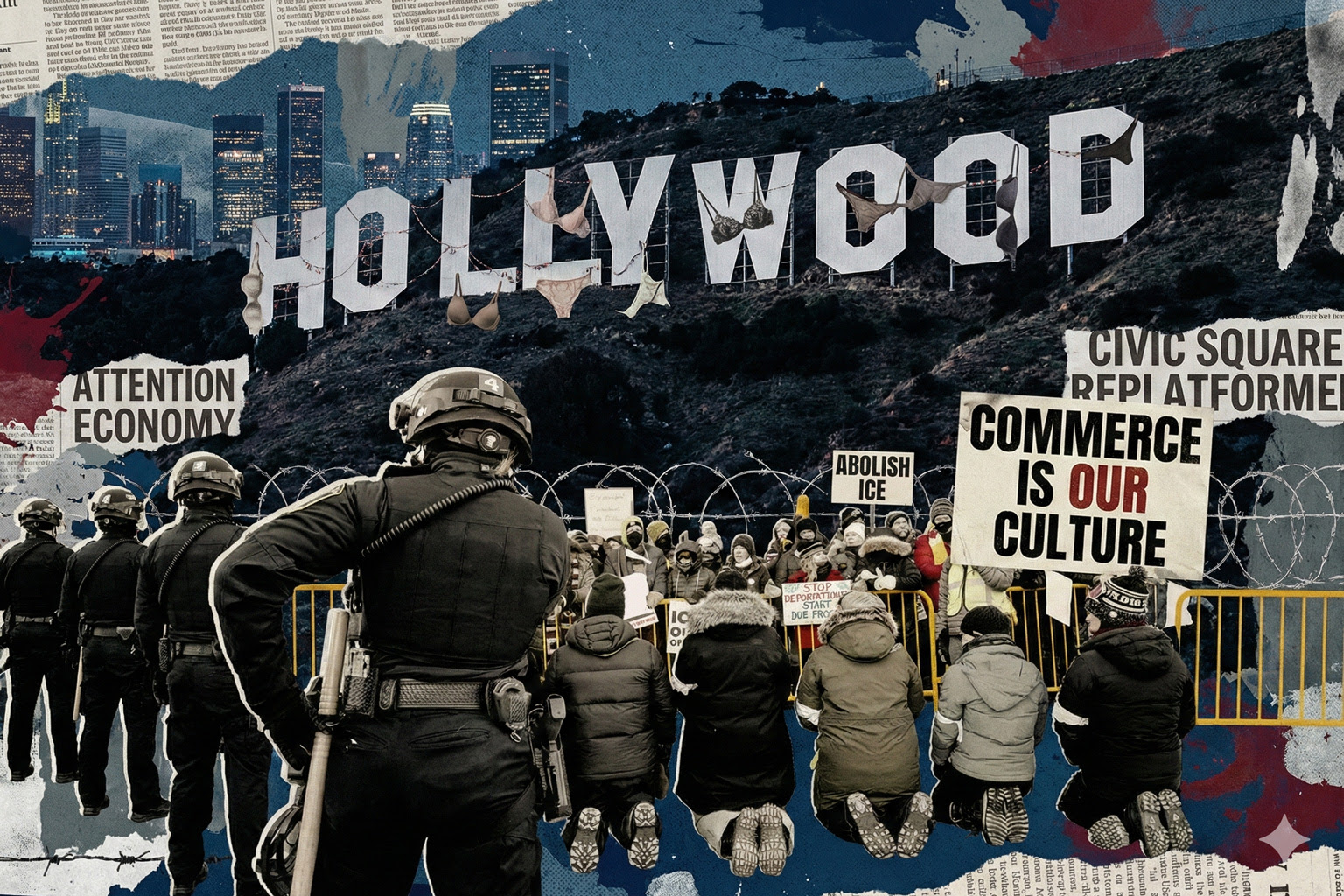

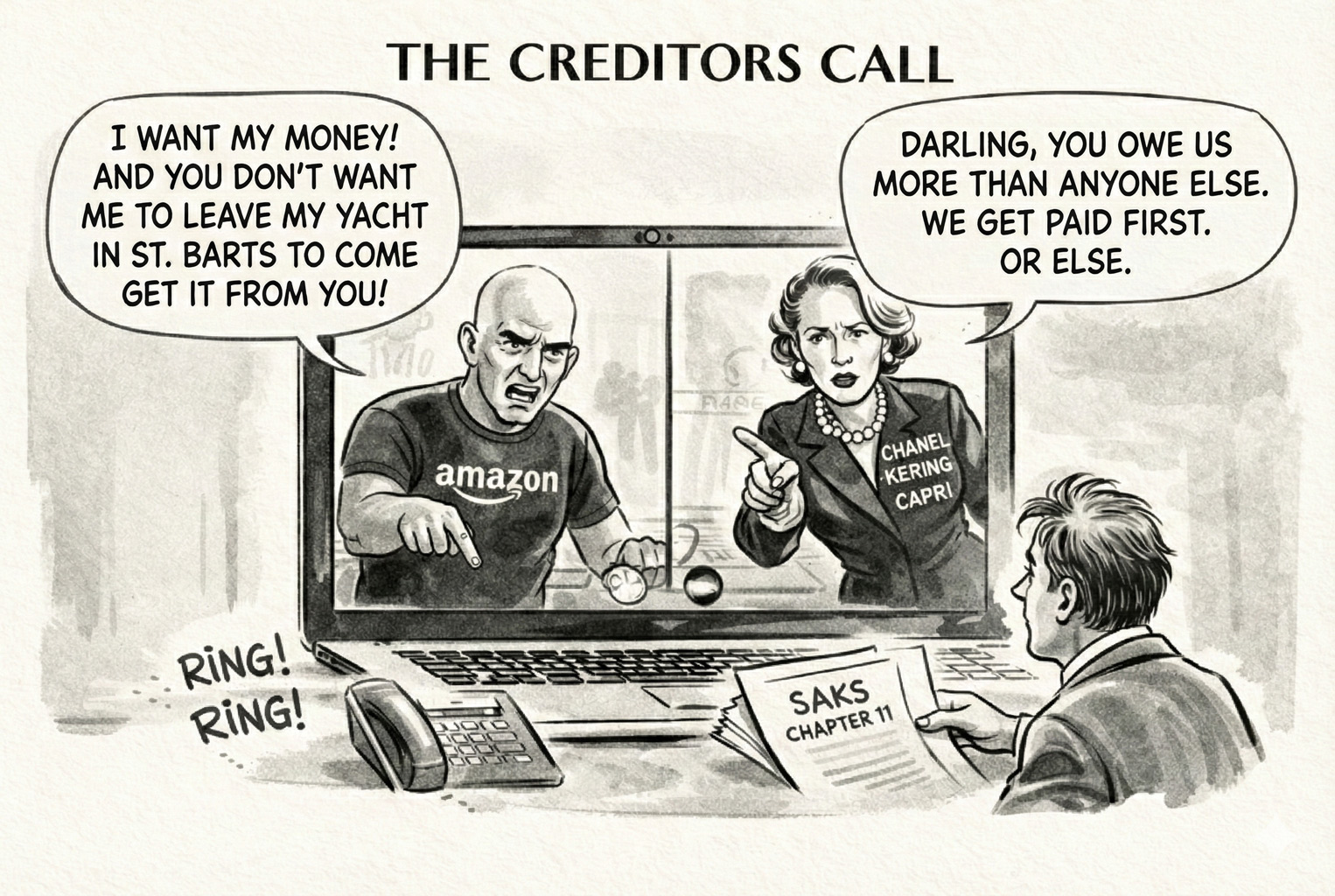
.svg)
